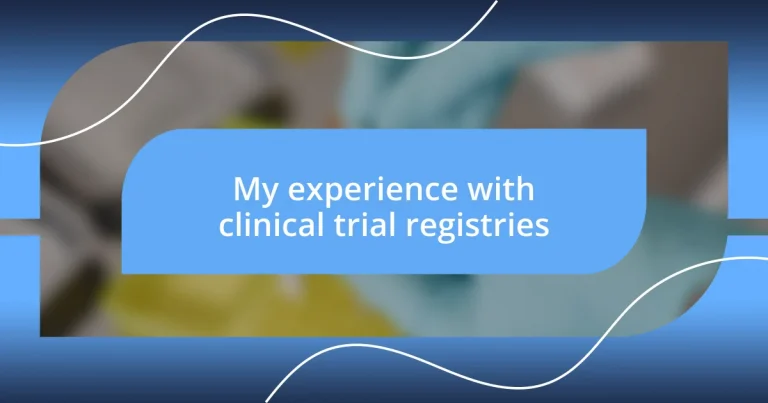Key takeaways:
- Clinical trial registries enhance transparency and accountability in medical research, empowering patients with vital information to make informed health decisions.
- Challenges such as data inconsistency, overwhelming volumes of information, and access limitations can hinder effective navigation of these registries.
- The future of clinical trial registries is bright, with advancements in technology likely to improve accessibility, user experience, and real-time updates, enhancing patient engagement and collaboration.
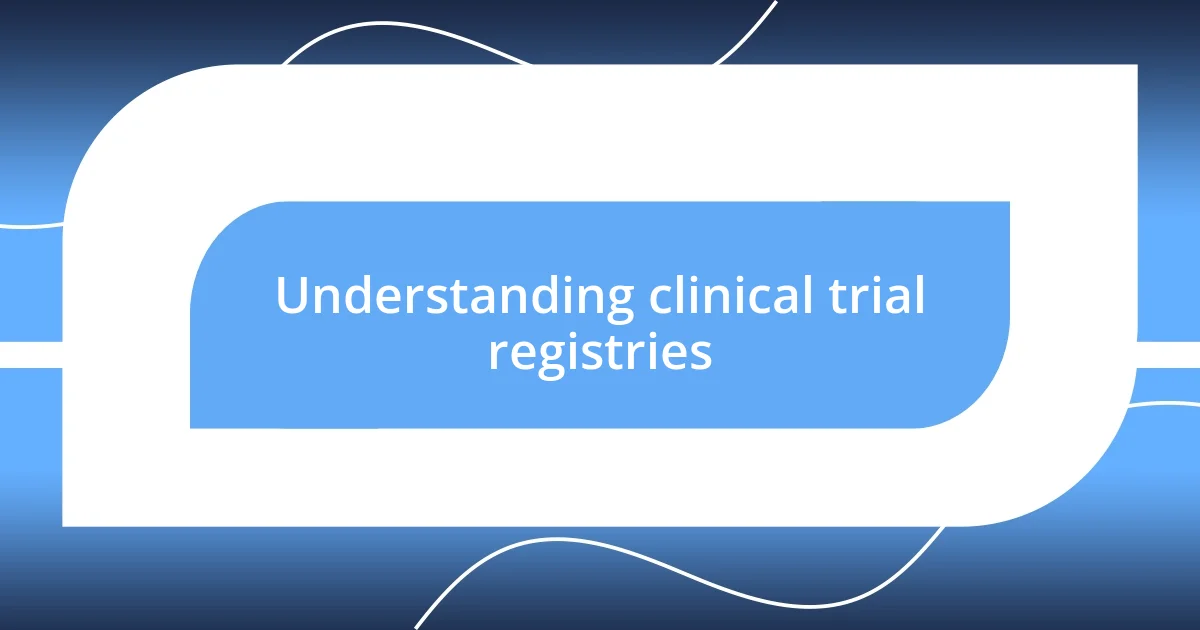
Understanding clinical trial registries
Clinical trial registries play a pivotal role in the research landscape. I remember the first time I discovered one; it felt like stumbling upon a treasure trove of information. The idea that researchers are required to register their trials before they begin sparked my curiosity about how this promotes transparency and ethical standards in medical research.
Every time I browse through different registries, I’m struck by the volume of data available—it’s not just a dry list of studies, but a narrative of progress against diseases. Have you ever wondered why knowing about these trials is so crucial? I’ve often reflected on how clinical trial registries not only help patients find potential treatment options but also contribute to the larger scientific discourse by preventing duplication of efforts and enhancing collaboration among researchers.
It’s inspiring to see how these registries ensure accountability. Each entry tells a story of hope and innovation, and it reminds me of my own moments of uncertainty when searching for trials for a loved one. When we understand clinical trial registries, we begin to appreciate their power—not just as an archive, but as a living, breathing entity that connects patients, researchers, and the relentless pursuit of medical advancement.
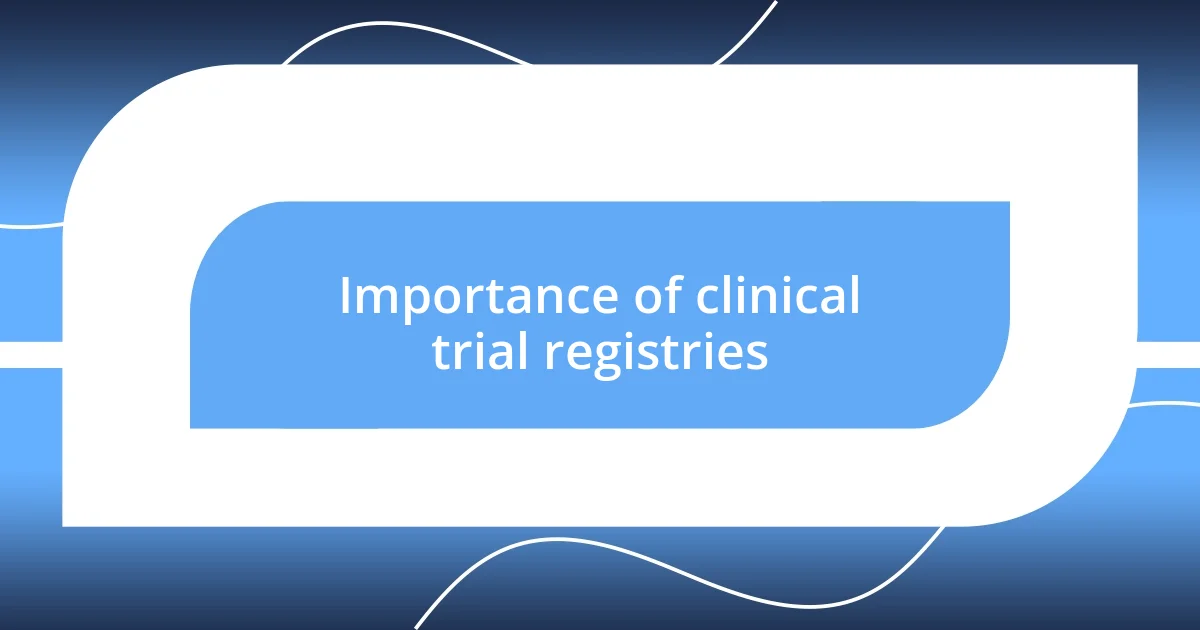
Importance of clinical trial registries
Clinical trial registries are essential tools for maintaining transparency in medical research. From my own experience, I’ve seen how easily miscommunication can occur in the absence of standardized information. For instance, when my friend was searching for clinical trials, we initially struggled with conflicting information from various sources. Accessing a consolidated registry made a world of difference, streamlining her options and giving her peace of mind about the treatments available.
What I find really fascinating is the protective layer these registries provide for patients. They guarantee that any clinical trial is publicly accessible, which increases accountability among researchers. I once attended a seminar where a researcher shared her journey of wanting to keep her findings under wraps. It was powerful to hear her realize that sharing her work could prevent others from making the same mistakes, highlighting how registries foster a culture of learning and growth in the scientific community.
Furthermore, registries serve as a bridge connecting diverse stakeholders, including patients, researchers, and healthcare professionals. I vividly recall discussions with fellow patients about how challenging it can be to navigate the clinical landscape. When we utilized these registries, we found that they not only offered clinical trial information but also insights into ongoing research trends. This accessibility empowers patients to take charge of their health decisions while inspiring researchers to collaborate effectively.
| Aspect | Importance |
|---|---|
| Transparency | Provides clear information about ongoing trials, reducing misinformation. |
| Accountability | Ensures researchers uphold ethical standards by publicly sharing their findings. |
| Collaboration | Encourages partnerships by showcasing research efforts, preventing duplication. |
| Patient Empowerment | Equips patients with the information they need to make informed decisions about their treatment options. |
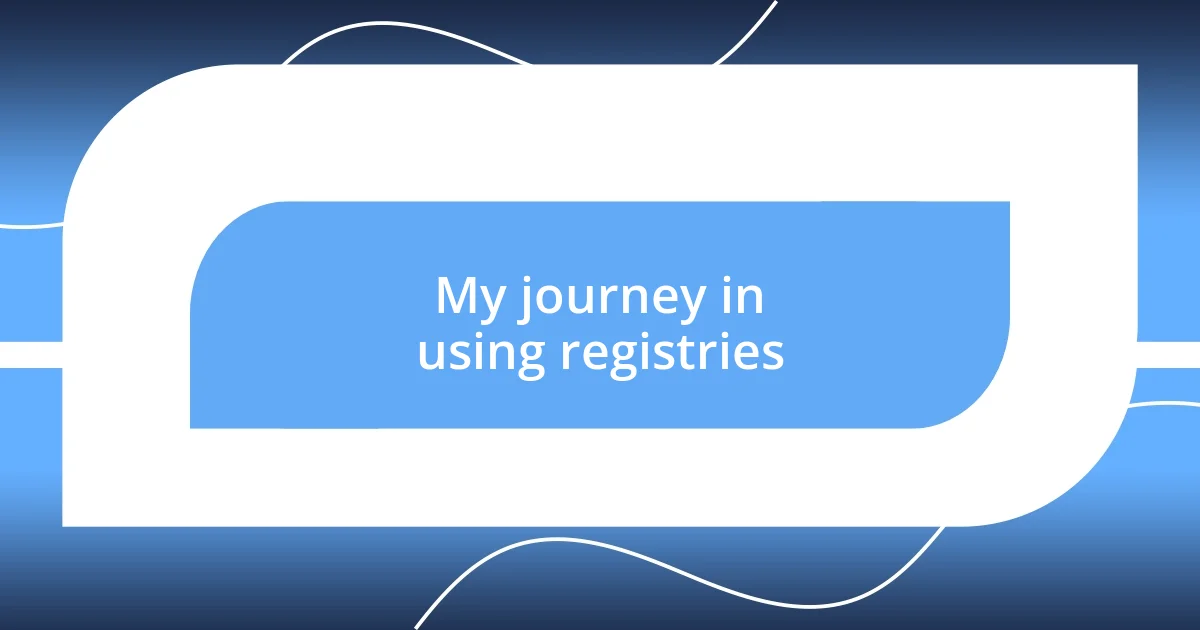
My journey in using registries
When I first started using clinical trial registries, it felt like unlocking a door to a new realm of understanding. I remember poring over the detailed listings, feeling both overwhelmed and empowered. It was an emotional journey, largely driven by my desire to find answers for a family member battling a challenging illness. Each search through a registry felt like digging for treasure—every trial had the potential to lead to hope.
The clarity and structure that registries provided were invaluable in those moments. There were times when I felt adrift in a sea of medical jargon and complex protocols. The moment I found a registry that laid everything out in plain language was a game changer. It helped to compile key details like eligibility criteria, locations, and contact information in one place. I could finally see a pathway, thanks to the organized data, and that made all the difference.
- Discovering Options: I was able to identify potential trials that aligned with my family member’s condition after hours of sifting through disparate resources.
- Emotional Relief: Knowing there was a structured place to turn for information eased my worries and gave me a sense of control amid uncertainty.
- Connecting with Others: Forums linked within registries introduced me to other families facing similar challenges, creating a support network that felt incredibly validating.
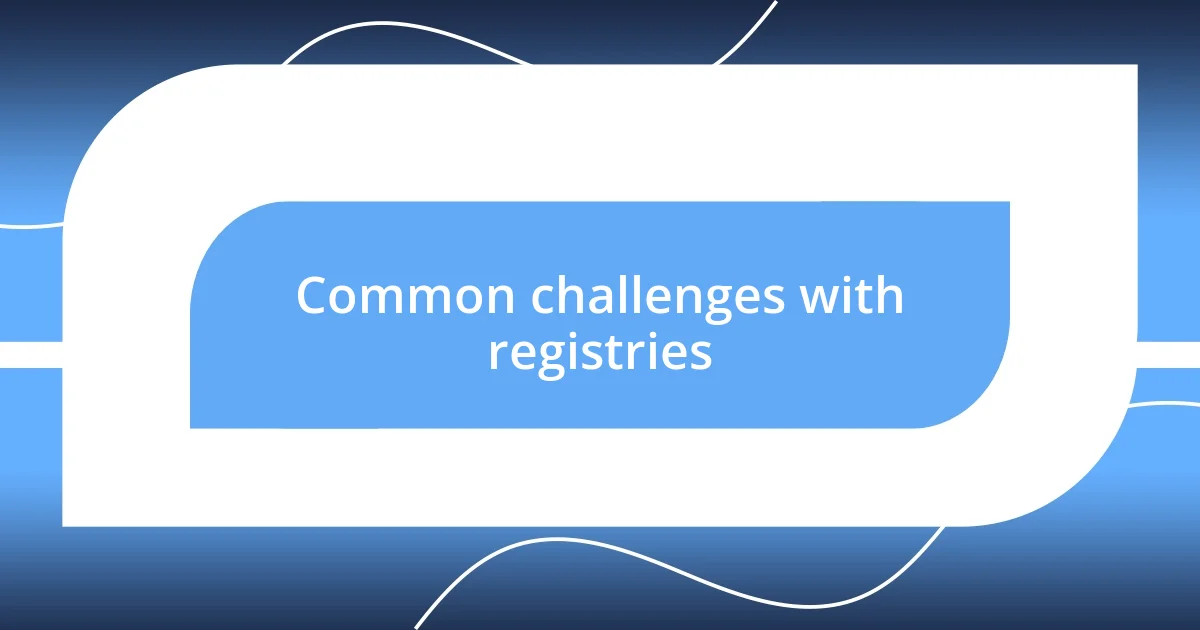
Common challenges with registries
When I think about the common challenges with clinical trial registries, one major issue springs to mind—data inconsistency. In my experience, navigating multiple registries often feels like piecing together a jigsaw puzzle. I’ve encountered trials listed under different names or with varying details, leaving me questioning the validity of the information. Isn’t it frustrating when you’re trying to make informed decisions but can’t trust what you’re reading?
Another challenge is the sheer volume of information. While registries aim to provide comprehensive details, I’ve often felt overwhelmed by the length and complexity of the listings. There were times when I found myself skimming through dense language instead of getting the practical insights I desperately needed. I remember thinking, “Why can’t these be more straightforward?” That moment of clarity is essential when you’re in search of answers, and unfortunately, it’s easy to get lost in the noise.
Access can also pose significant hurdles. While I’ve found immense value in certain registries, there were instances where limited access to specific studies created a barrier. I fondly recall a time when I wanted to explore a promising trial but was stymied by access restrictions. It made me realize how crucial it is for registries to ensure that vital information is genuinely available to all interested parties. It prompted this question in my mind: How can we advocate for more inclusive access to information that could potentially save lives?
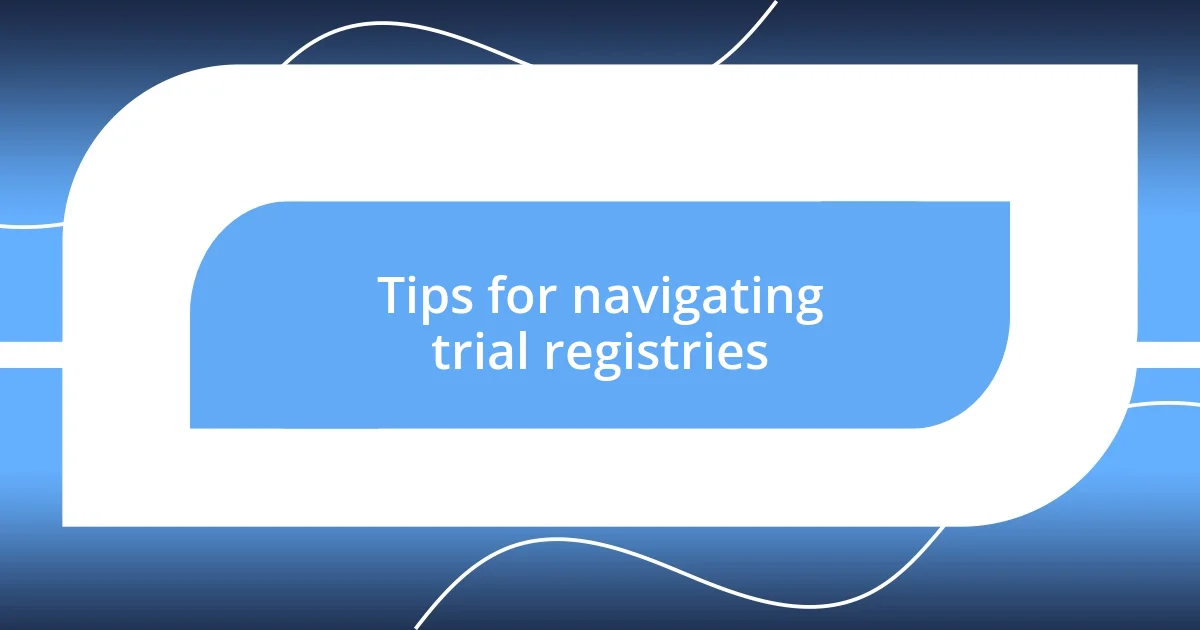
Tips for navigating trial registries
To effectively navigate clinical trial registries, I always recommend starting with a clear focus on your specific needs. When I first began my search, I learned the importance of honing in on eligibility criteria right away. Rather than scrolling through endless listings that didn’t apply, I zeroed in on trials that were a genuine match. This approach saved me so much time and frustration—why waste energy on what doesn’t fit your situation?
Additionally, I found that taking notes during my research kept my thoughts organized. I remember jotting down the details of each potential trial, such as key contacts and location information. It may seem simple, but this practice was crucial during discussions with healthcare providers. Having that information ready made conversations much smoother, and it empowered me to ask the right questions. Have you ever felt stumped in a meeting, wishing you had all your notes handy? It’s a game-changer to avoid those awkward pauses.
Finally, don’t underestimate the power of reaching out. I had a moment when I hesitated to connect with the study coordinators directly, fearing they might not have time for me. But once I took the leap, I discovered they were often more than willing to answer queries and provide insights unstated in the listings. Their enthusiasm and willingness to assist left me feeling valued and connected in a way I hadn’t anticipated. Isn’t it enlightening when you realize that behind those clinical terms are real people eager to help?
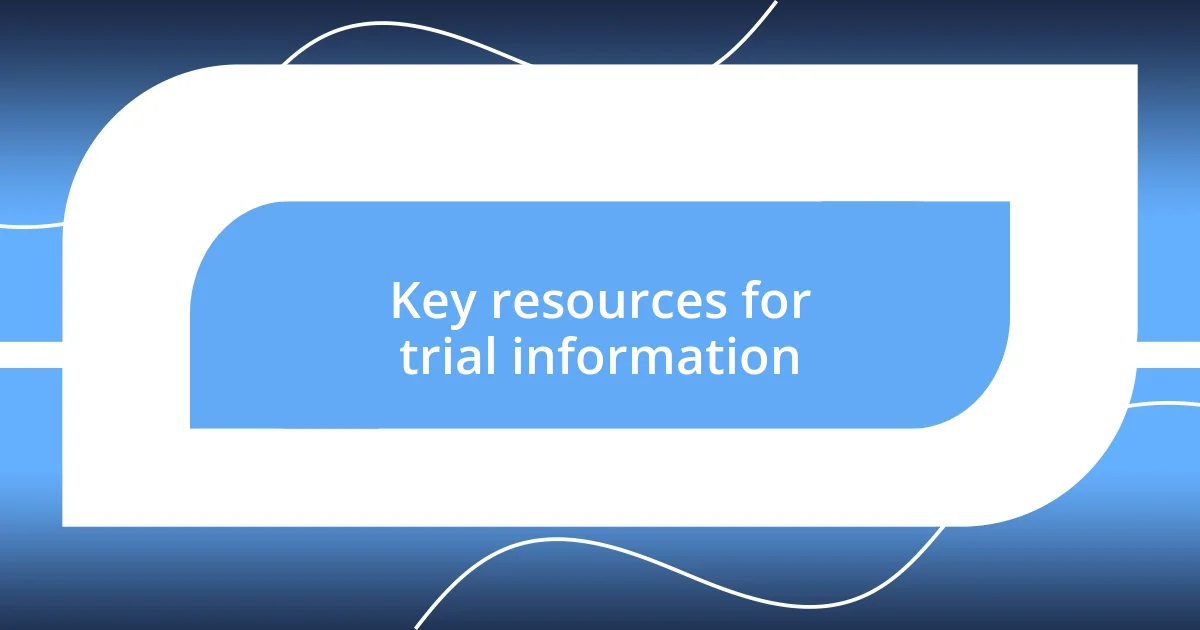
Key resources for trial information
One of the most reliable resources for trial information, in my experience, is ClinicalTrials.gov. This comprehensive database provides detailed listings of both publicly and privately funded clinical trials across the globe. I remember the first time I used it; I was amazed at how quickly I could find trials relevant to my condition. But what truly struck me was how the search filters allowed me to narrow down options by location and phase, ensuring I was looking at relevant opportunities without wasting my time. Have you ever found a tool that suddenly made everything click into place? That’s how ClinicalTrials.gov felt for me.
Equally valuable are European Union Clinical Trials Register and WHO’s International Clinical Trials Registry Platform. They offer a wealth of information, especially for finding trials outside the U.S. While I was researching potential studies, I stumbled upon a trial listed on the EU registry that was not available on ClinicalTrials.gov. It reminded me of the importance of exploring multiple registries. It is easy to overlook one just because it isn’t well-known, but doing so could potentially open up incredible opportunities!
Lastly, I can’t stress enough the importance of patient advocacy groups as additional resources. They often maintain databases or informative sections on ongoing clinical trials related to specific conditions. I recall reaching out to a group for my condition — they not only had insights into trials but also shared personal success stories that immensely motivated me. It was like finding a supportive community in the midst of a daunting process. Why settle for just the data when you can connect with those who’ve walked the same path? This personal touch adds an invaluable layer to the journey of participating in clinical trials.
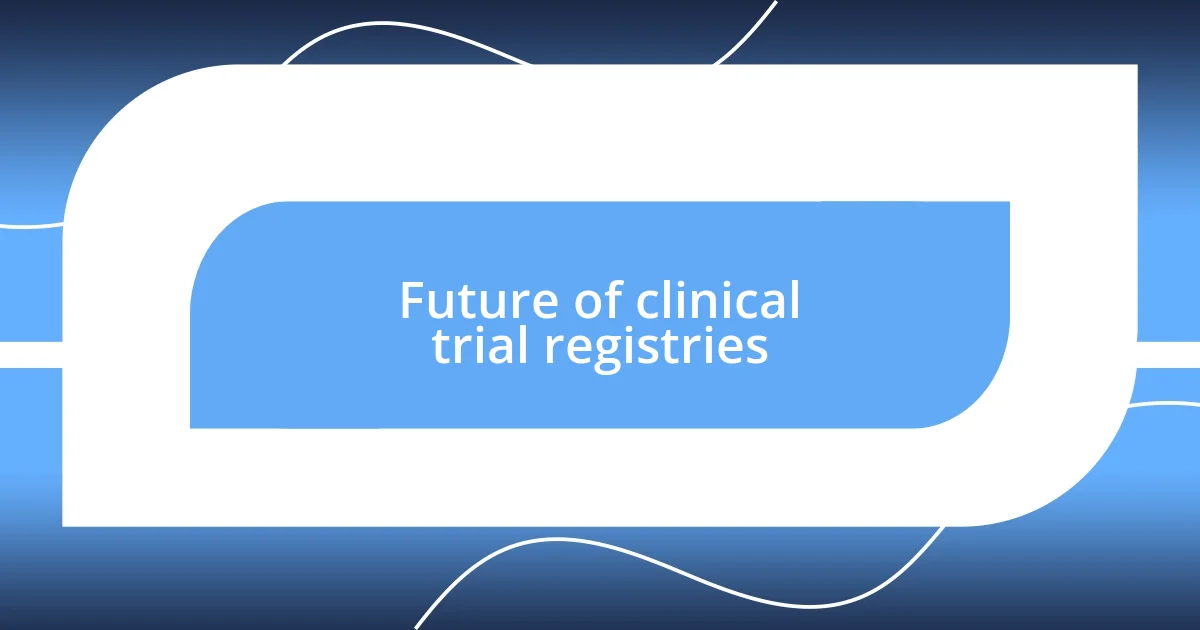
Future of clinical trial registries
The future of clinical trial registries looks promising as technology continues to enhance accessibility and efficiency. I vividly remember a time when I struggled to find relevant trials, often feeling lost in a sea of outdated information. But as registries evolve, innovations like user-friendly interfaces, AI-driven search algorithms, and mobile apps are set to transform this experience. Isn’t it exciting to think that soon, we might have personalized recommendations tailored just for us?
One specific advancement I’ve noticed is the integration of real-time updates within registries. This means that when a trial’s status changes or new results are posted, we’ll be informed immediately. I can’t help but think back to my own experience waiting anxiously for information on a trial’s progress—having timely notifications would have alleviated so much uncertainty. How would you feel knowing that any significant change regarding a trial you’re interested in is just a ping away?
As these platforms continue to prioritize patient engagement, I can definitely see the potential for direct communication channels between participants and researchers. Just imagine having a platform where you could easily voice your questions or concerns and receive instant feedback. That kind of connection could bridge the gap between researchers and patients, fostering an environment of collaboration that feels much more human. It’s a development that could not only enhance the overall trial experience but also empower us—how powerful would it feel to be an integral part of the research process?












